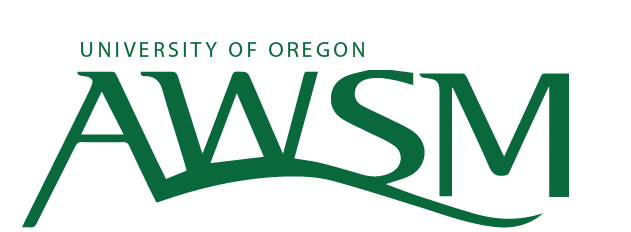
By: Ruby Quintero-Walton and Maggie Vanoni
UO AWSM hosted Soccer Night on Feb. 6. We were fortunate to host Therese Bottomly (Oregon soccer alum and Editor and Vice President of Content at The Oregonian), Kat Mertz (Oregon soccer head coach) and Kayla Knapp (Content and Strategy for the Portland Timbers and Thorns). Through the experiences of each woman, we learned about how media coverage of women’s soccer has changed throughout the years and this has impacted teams, players, coaches and the journalists who cover the sport. Here are our five takeaways:
1. There are non-controllable barriers that prevent equal representation between men and women sports, specifically with soccer. Kayla and Therese talked about how most team sponsors put most of their time and money into promoting men’s sports. With her role at the Oregonian, Therese mentioned that during times of newsroom shrinkage, publications have to keep their story priorities on the stories they know are going to get the most clicks. And often times, the stories about men sports get more readership.
“We try really hard to do equal amounts of coverage across the board. We‘re always trying to be cognizant of each side. But there are barriers that exist that don’t allow it to happen.” –Kayla Knapp
“When newsrooms shrink, then you have to make choices and decide what’s going to get covered less. You don’t want to cover things that people aren’t going to read. It’s a struggle.” –Therese Bottomly
2.As a reporter, show you care. Kat emphasized that she would like to see more reporters show that they care about the team and its players during coverage. She said, as a coach, she can tell when a reporter is just on assignment and trying to make a deadline vs a reporter who has done their homework and wants to learn.
“Care. Invest. You can tell when the reporter is doing an assignment because they’ve been told they need to cover women’s soccer. You can tell when someone is invested. I think it’s important to be in it. I think investing and showing that you want to know more about it would be helpful.” –Kat Mertz
3. Be confident and always stand up for yourself. Kayla emphasized that even just pretending to be confident, allows one to feel more confident. This goes a long way in how you carry yourself and how others see you, and how they will treat you.
“I’ve never felt more respected [as a woman] at a job [than I do now]. I’ve found that standing up for myself, being confident and being strong goes a long way to get people to take me seriously [in this industry].” –Kayla Knapp
4. Your social media presence is an important part of who you are and how you’ll get a job. Be aware of your posts and your audiences. All three women expressed making sure your social media channels are clean and professional because you never know who can see something. They suggested that if you want to have a platform to express yourself more loosely, to create private accounts and make it clear that it’s not a professional account.
“I have my own personal presence [on social media] and I’ve changed a lot. I can say whatever I want and I’m thankful that my organization is cool with that. But I try to preserve my relationship within the team. I think it’s important to be your authentic self but also [think about my posts when] it comes to my job. I try to be even keel. You pick and choose and be smart about what you’re putting out there, but you still need to be authentic.” –Kayla Knapp
“I think there’s a line of being authentic and understanding what my base is. And I want to be true to who I am. I won’t go off on certain politicians or teams. Nothing is private, and I’ve been more aware about what I post [on social media].” –Kat Mertz
“You do have to change [your social media]. If you’re representing something, you have to look at your social media and look at your bias. What we want them to do is recognize that what they do on social media, that is how the public is going to perceive them.” –Therese Bottomly
5. Journalists have a responsibility to treat men and women equally. We are a team. People are beginning to call journalists on their gender bias and how that affects the public treatment of someone. The way you treat a male you’re interviewing should be the same for a female. This respect is also important in the media workplace as well.

